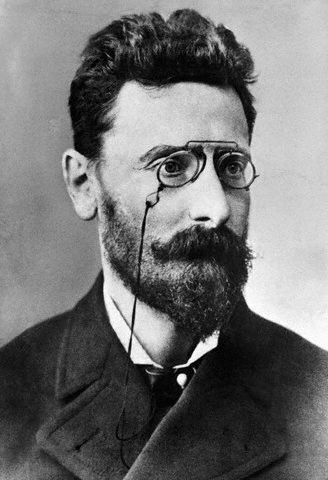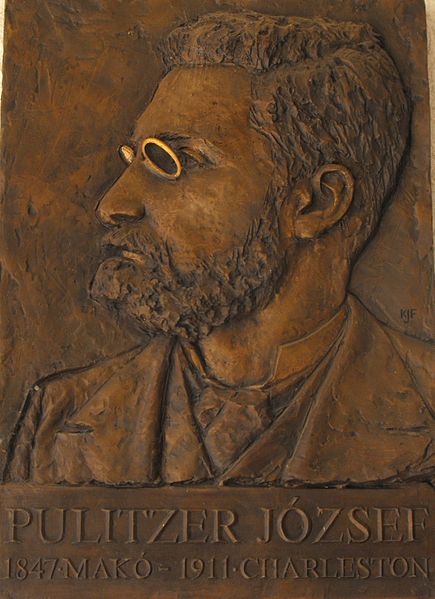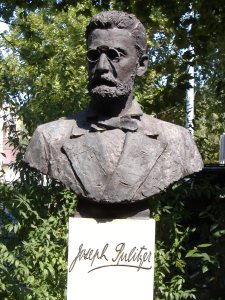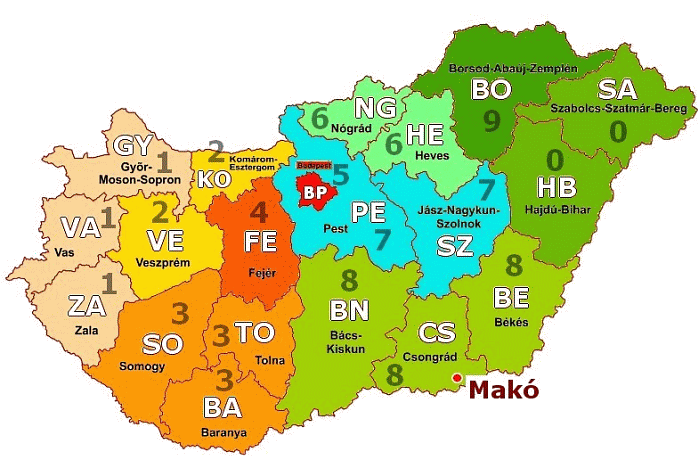Makó és környéke a világűrből / Skyview of Mako and its district
Webkamera élő: Makó Polgármesteri Hivatal
Webcamera live: Makó Downtown, City Hall
GPS: 46.2148898N 20.4783761E
WWLocator: KN06FF 71jn
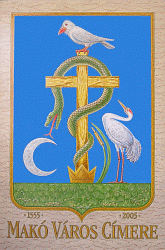
Makó az ország délkeleti szegletében, a román határ közelében, a Maros jobb partján, a megye székhelyétől, Szegedtől 30 km-re, keletre esik. Két történeti táj: a rétség és a mezőség találkozásánál fekszik.
Éghajlata meleg; a nyár száraz és forró. Időjárása szélsőséges; a magas nappali hőmérsékletet éjjeli lehülés követi. Éghajlatilag a forró nyár jellemzi. Itt fordul elő hazánkban a legtöbb nyári nap (85-90), átlagos évi középhőmérséklete 10,9 °C. A napsütéses órák évi átlagos összege meghaladja a 2100 órát, így napfényben az ország egyik leggazdagabb vidéke. A csapadék kevés, 112 évi átlag 585 mm.
Makó tengerszint fölötti magassága 82 m, a nyugatra eső ártéri területé átlagosan 79 m. Makó vízföldrajzi helyzetét a Maros és a Szárazér ősi vízrendszere határozza meg. Földtanilag a város termőtalajának legnagyobb részét a lösz, Nyugati felét réti agyag, a Maros közelében homokos öntéstalaj teszi ki.
 Mako is situated in the south-eastern part of the country not far from the Romanian border, north of the river Maros and 30 km from the county seat, the city of Szeged. It is located at the meeting place of two historical regions: the pasture land and grassland regions.
Mako is situated in the south-eastern part of the country not far from the Romanian border, north of the river Maros and 30 km from the county seat, the city of Szeged. It is located at the meeting place of two historical regions: the pasture land and grassland regions. The town has a warm climate, with hot, dry summers. The weather can be extreme; high daytime temperatures being followed by cool evenings. Regarding temperatures, the town can be characterized by its hot summers. The region enjoys the most sunny summer days (85 to 90) in the country. The average annual temperature in the town is 10.9 °C. The annual average of sunshine exceeds 2,100 hours, therefore Makó is one of the country's richest regions in sunshine. The precipitation is low, with an annual average of 585 mm over the last 112 years.
The average height above sea level is 82 m, with the catchment area to the west being on average 79 m. The water topography of the town is determined by the ancient water system of the Maros and the Szárazér. Regarding its geological situation, the majority of the town's arable land consists of loess, with the western area consisting of clay, with sandy deposits in the vicinity of the Maros.
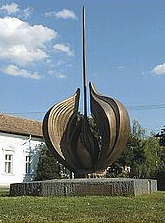
†Galamb József (1881-1955)
| Galamb József Makón született, tanulmányait Budapesten végezte, a mai Bánki Donát Műszaki Főiskola jogelődjénél. Gépészmérnöki diplomája megszerzése után rövid ideig a diósgyőri Vasgyárban dolgozott műszaki rajzolóként, majd a Magyar Automobil Rt.-nél, ahol egy németországi tanulmányutat nyert. 1903-ban több német városban járt, mindenütt szakmunkásként dolgozott. Ekkor hallott az 1904-es amerikai autó világkiállításról, ezért megtakarított pénzén októberben hajón elutazott Amerikába. A Westinghouse Műveknél szerszámkészítőként helyezkedett el. | Az akkor alig kétéves Ford Motor Company kötelékébe 1905 decemberében került, mint tervező. Az N-modell hűtőrendszerének áttervezése után a gyár főkonstruktőre lett, s a híres T-modell sok fontos alkatrészét ő tervezte. 1915-től a Fordson-traktor tervein dolgozott. 1921-ben ösztöndíjat alapított olyan makói, szegény sorsú diákoknak, akik felső ipari iskolában kívántak tanulni. Az első világháború alatt hadigépek szerkesztésével foglalkozott, pl. tengeralattjáró-keresővel. A második világháború idején Ford ötletére hathengeres kiskocsit tervezett, amely 1942-ben készült el. 1944-ben visszavonult az aktív munkától. |
 József Galamb (English: Joseph A. Galamb; 3 February, 1881 - 4 December, 1955)
József Galamb (English: Joseph A. Galamb; 3 February, 1881 - 4 December, 1955) mechanical engineer was born in Makó, Hungary. | |
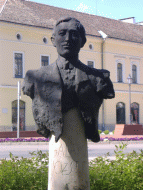 Galamb finished his education at the Budapest Industrial Technology Engineering Course (the predecessor of the present-day Óbuda University Bánki Donát Politechnical College) in 1899. After receiving his diploma in mechanical engineering he worked at the Steel Engineering Factory in Diósgyőr as a draftsman. He next served one year in military service. He worked at the Hungarian Automobile Co., where he won a postgraduate scholarship to Germany. After the navy he went to see the world — Vienna, Dresden, Berlin, Hamburg and Bremen. In 1903 he worked in many German cities as a skilled worker, he got the best education at Adler in Frankfurt. He was hired to assemble automotive engines in a process in which each engine was built completely by one man. When he learned of the 1904 American Auto World Fair in St. Louis, he used his savings to travel to America by ship in October 1903. After two months in New York, he found employment as a toolmaker at the Westinghouse Corporation in Pittsburgh. Although he planned to go back to Germany in 1904, instead he joined the Stearns Automobile Company in Cleveland as a carburetor maker.
Galamb finished his education at the Budapest Industrial Technology Engineering Course (the predecessor of the present-day Óbuda University Bánki Donát Politechnical College) in 1899. After receiving his diploma in mechanical engineering he worked at the Steel Engineering Factory in Diósgyőr as a draftsman. He next served one year in military service. He worked at the Hungarian Automobile Co., where he won a postgraduate scholarship to Germany. After the navy he went to see the world — Vienna, Dresden, Berlin, Hamburg and Bremen. In 1903 he worked in many German cities as a skilled worker, he got the best education at Adler in Frankfurt. He was hired to assemble automotive engines in a process in which each engine was built completely by one man. When he learned of the 1904 American Auto World Fair in St. Louis, he used his savings to travel to America by ship in October 1903. After two months in New York, he found employment as a toolmaker at the Westinghouse Corporation in Pittsburgh. Although he planned to go back to Germany in 1904, instead he joined the Stearns Automobile Company in Cleveland as a carburetor maker.
Galamb applied for work at the Silent Northern plant, the Cadillac plant and the Piquette Plant of Ford. All three offered him work within three hours. He joined the Ford Motor Company (twenty-four years old at that time) as a designer in December 1905. The Ford Motor Company had 300 employees at the time assembling the Ford Model A from purchased parts. Subsequent to redesigning the cooling system for the Model N, he became the chief designer of the company, and devised many of the parts of the famous Model T. He was one of the co-developers of the assembly line in 1913. From 1915 he worked on the Fordson tractor design. In 1921 he founded a scholarship for the poor students of his native town who wished to take up higher education at trade school. During World War I he was busy designing military hardware, e.g. anti-submarine detection systems. He visited Hungary many times, lecturing at the Association of Hungarian Engineers and Architects. During World War II on Ford's suggestion, he designed a small six-cylinder car, which was completed in 1942. On doctor's orders he retired from active work in 1944.
| |
†Pulitzer József (1847-1911)
